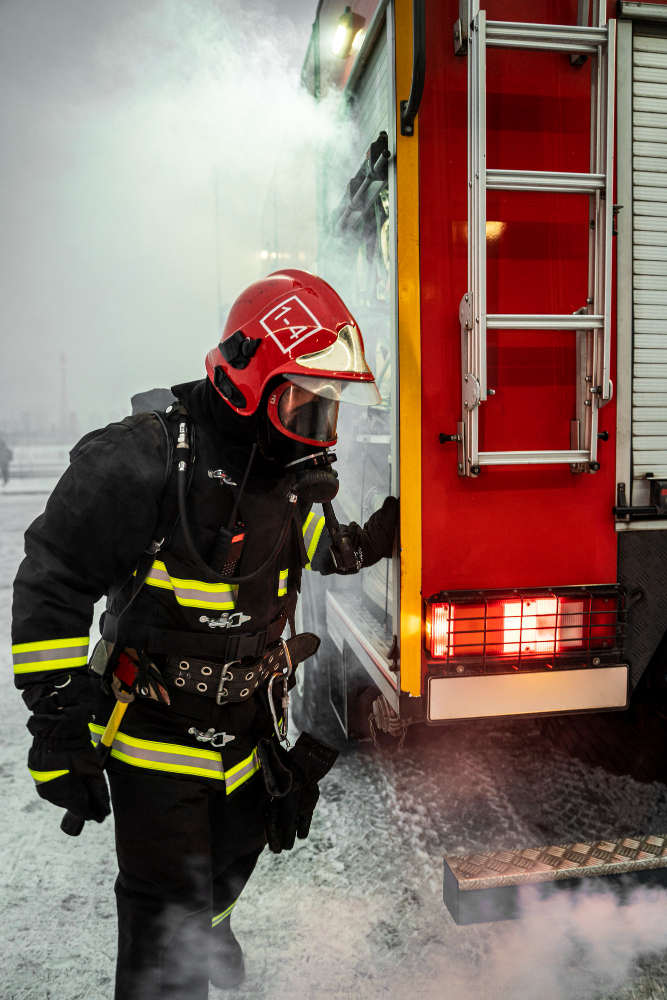Certified Fire Inspector I – (CFI-1)
BASKAN stands out as the premier education provider for fire fighting, fire protection, and fire safety courses in the region, with programs accredited by the National Fire Protection Association (NFPA). Our courses are designed to play a significant role in workplace fire prevention regulations, providing participants with top-tier fire safety knowledge and practical insights. BASKAN’s expert trainers are dedicated to ensuring the safety and well-being of building occupants, with a keen focus on current safety trends and requirements.
The NFPA Certified Fire Inspector I (CFI-I) certification program at BASKAN is a response to the growing demand from local, state, and national agencies for a certification pathway grounded in NFPA 1031, the Standard for Professional Qualifications for Fire Inspector and Plan Examiner, along with other key NFPA codes and standards. This program equips fire inspectors with the skills and qualifications needed to meet rigorous safety standards, providing a solid foundation for a career in fire inspection and safety.
What is a Certified Fire Inspector?
Certified fire inspectors are trained professional responsible for assessing buildings, structures, and facilities to ensure compliance with fire safety codes and regulations. These inspectors conduct detailed evaluations to identify potential fire hazards, assess compliance with safety standards, and provide recommendations for corrective actions. They are critical in ensuring public safety and minimizing the risk of fire-related incidents.
Key Responsibilities of a CFI:
Certified fire inspectors have a range of responsibilities, including:
- Inspections: Conducting regular inspections of buildings and facilities to ensure compliance with fire codes, life safety standards, and other regulations.
- Fire Prevention: Identifying potential fire hazards and recommending preventive measures to reduce risks.
- Code Compliance: Ensuring that buildings meet the requirements outlined in local, state, and national fire codes.
- Documentation: Maintaining detailed records of inspections, violations, corrective actions, and follow-up activities.
- Education: Educating property owners, managers, and occupants about fire safety practices and code compliance.
- Collaboration: Working with fire departments, building officials, and other stakeholders to ensure comprehensive fire safety.
Skills and Qualifications Required:
To become a certified fire inspector, certain skills and qualifications are essential:
- Knowledge of Fire Codes: Understanding of local, state, and national fire codes, including NFPA standards.
- Analytical Skills: Ability to assess fire risks and identify areas of non-compliance during inspections.
- Attention to Detail: Ensuring thorough inspections and accurate documentation of findings.
- Communication Skills: Effectively communicating inspection results, code requirements, and safety recommendations to various stakeholders.
- Problem-Solving: Developing solutions to address fire safety issues and ensure compliance with regulations.
- Technical Knowledge: Familiarity with fire protection systems, building construction, and safety equipment.
The Certification Process:
To become a certified fire inspector, individuals typically undergo a structured certification process:
- Education: Many certified fire inspectors have a background in fire science, engineering, or a related field. Relevant coursework provides foundational knowledge in fire protection and safety.
- Experience: Gaining practical experience through internships, apprenticeships, or roles within fire departments or building inspection agencies.
- Certification Programs: Completing a recognized certification program, such as the Certified Fire Inspector (CFI) program offered by the National Fire Protection Association (NFPA).
- Examination: Passing a comprehensive examination to demonstrate knowledge of fire codes, safety practices, and inspection techniques.
- Continuing Education: Pursuing ongoing education and professional development to maintain certification and stay updated with evolving fire safety standards.
Benefits of Becoming a Certified Fire Inspector:
Pursuing a career as a certified fire inspector offers several advantages:
- Career Opportunities: Certified fire inspectors are in demand across various sectors, including government agencies, insurance companies, and private businesses.
- Public Safety Impact: Playing a direct role in promoting fire safety and protecting lives and property.
- Job Stability: The need for fire safety compliance ensures a consistent demand for certified fire inspectors.
- Professional Growth: Opportunities for advancement into supervisory roles, fire safety consulting, or related career paths.
- Competitive Compensation: Certified fire inspectors often receive competitive salaries and benefits packages.
Pursuing a career as a certified fire inspector offers several advantages:
- Career Opportunities: Certified fire inspectors are in demand across various sectors, including government agencies, insurance companies, and private businesses.
- Public Safety Impact: Playing a direct role in promoting fire safety and protecting lives and property.
- Job Stability: The need for fire safety compliance ensures a consistent demand for certified fire inspectors.
- Professional Growth: Opportunities for advancement into supervisory roles, fire safety consulting, or related career paths.
- Competitive Compensation: Certified fire inspectors often receive competitive salaries and benefits packages.

